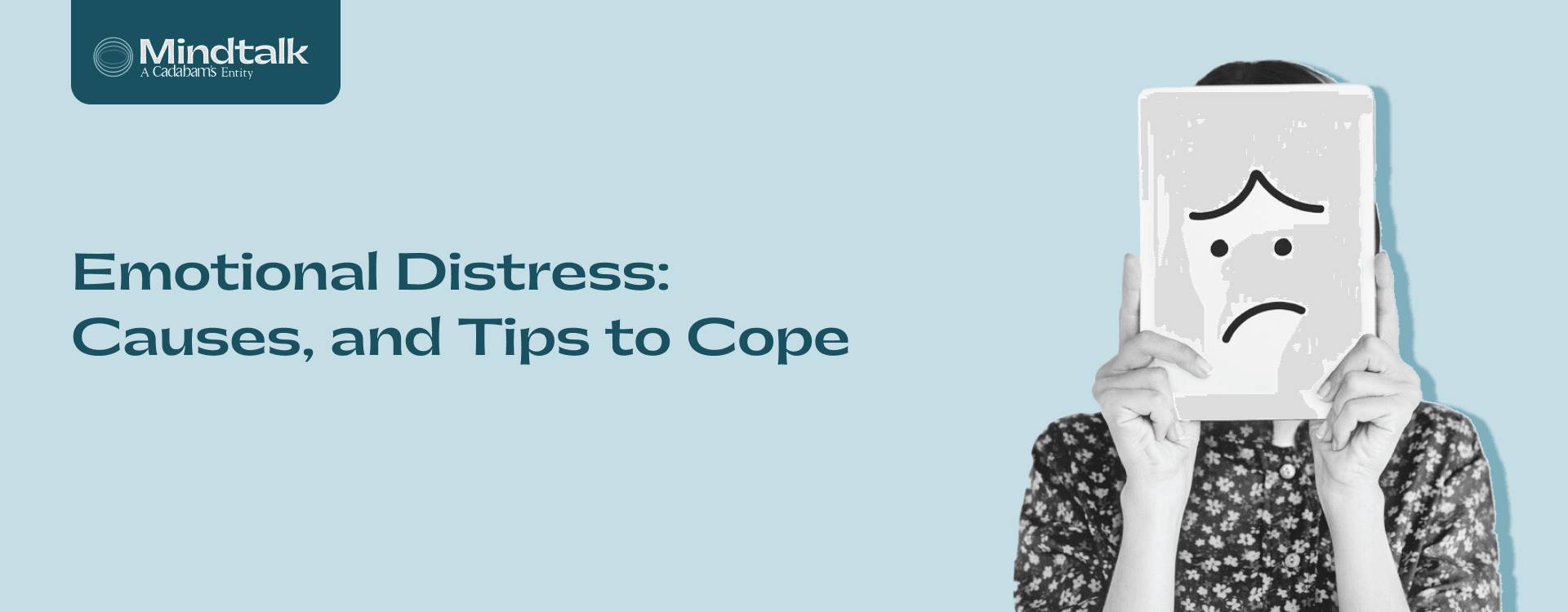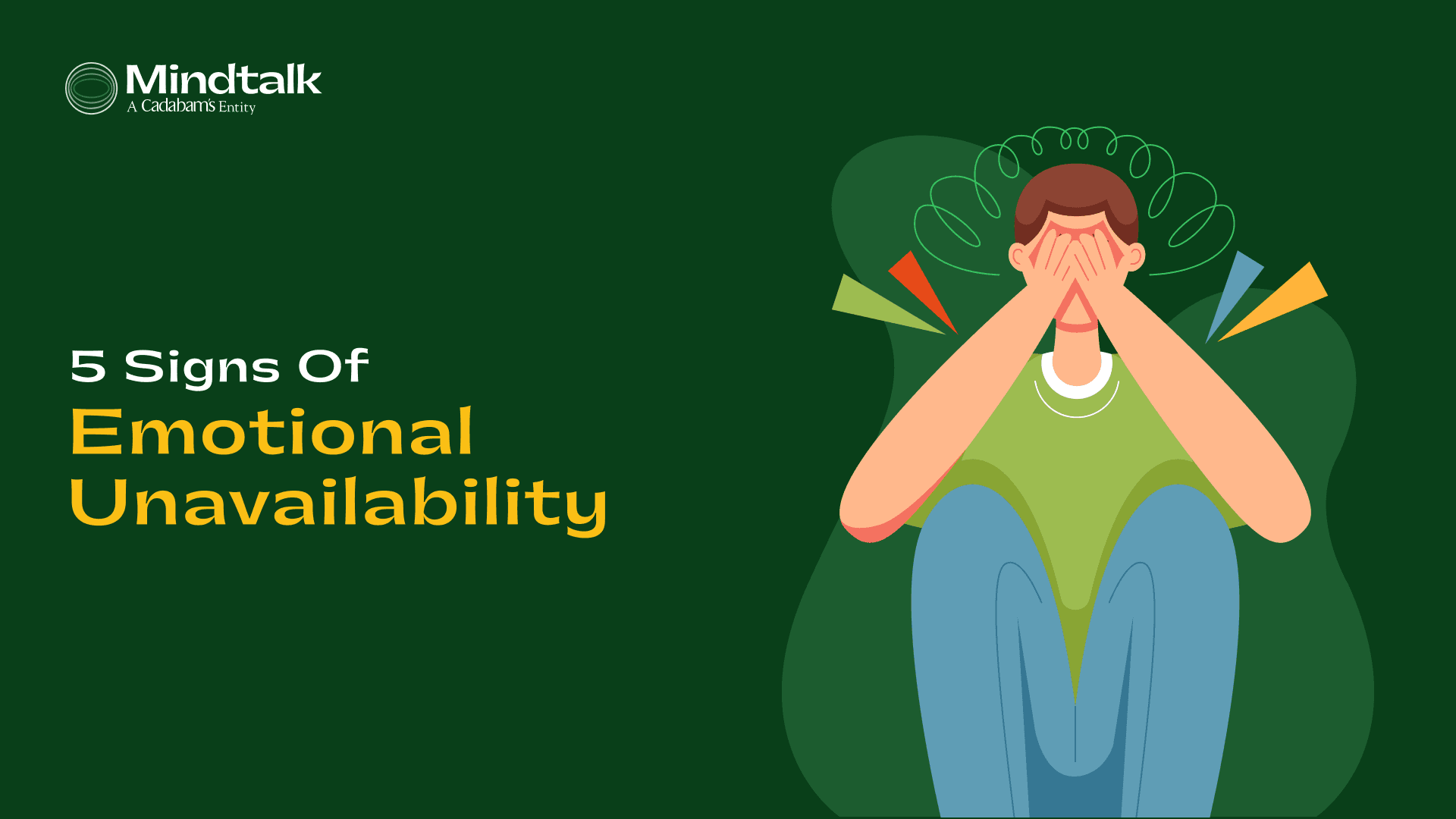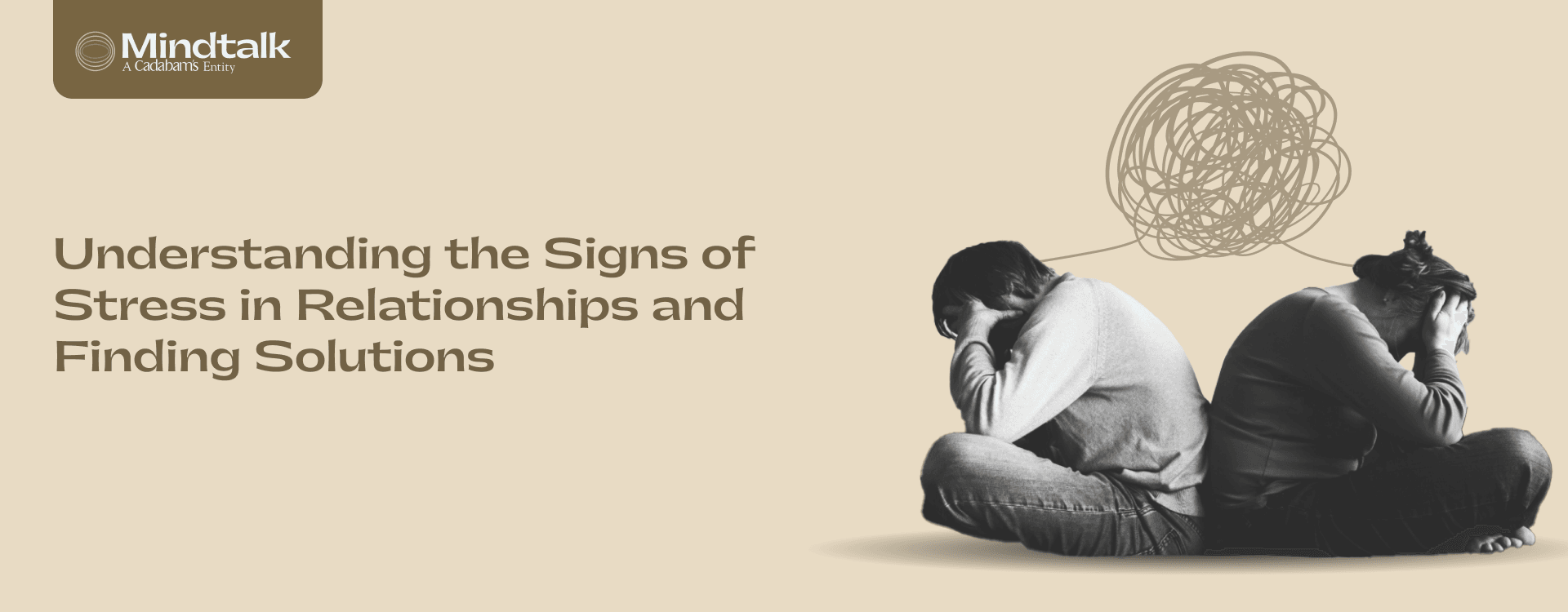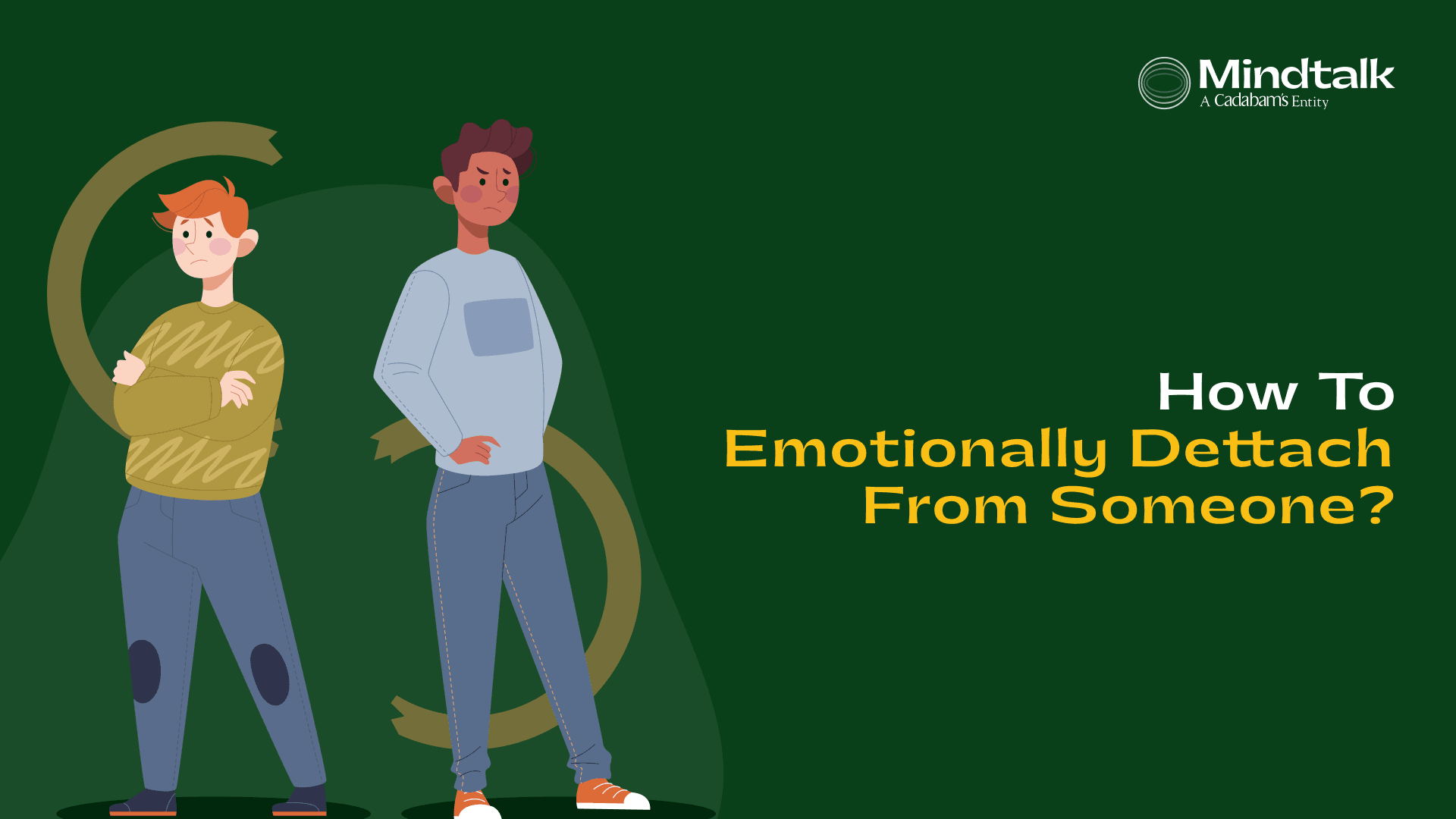Understanding Emotional Detachment: Causes, Symptoms, And Steps To Overcome It
Are you trying to detach from someone? Has the connection had a negative impact on you? Have you found it challenging to take a step back?
It's crucial to realise that you're not alone. We all have moments in our lives where we’ve been attached to a person who may engage in toxic behaviour patterns. These situations have adverse effects on our mood, personality, habits, and nature.

This raises the question of how we may distance ourselves from such people. This concept of emotional detachment refers to a state of mind in which a person disengages from their own or others' emotions. In certain instances, such as when dealing with toxic people or trauma, this can be a beneficial coping mechanism.
What Is Emotional Detachment?
Emotional detachment is a state where individuals disconnect from their emotions or from forming emotional connections with others. It can be voluntary, as a coping mechanism to protect oneself from stress or trauma, or involuntary, often due to underlying mental health conditions. This disconnection can impact relationships and overall well-being, making it challenging to engage emotionally.
What Are The Causes Of Emotional Detachment?
A range of factors can contribute to emotional detachment disorder. Here are some common emotional detachment causes:
Childhood Trauma Or Abuse
Individuals who have experienced trauma or maltreatment during childhood may develop emotional detachment as a coping mechanism. By suppressing their emotions, they protect themselves, often leading to an emotionally detached stance that persists into adulthood.
Unhealthy Relationships
Dysfunctional relationships marked by abuse, neglect, or betrayal can lead to emotional detachment. People in these situations may become emotionally detached, associating vulnerability with risk and distancing themselves to avoid potential harm.
Mental Health Issues
Conditions like depression, anxiety, and post-traumatic stress disorder (PTSD) can contribute to emotional detachment symptoms. These disorders can make it harder for individuals to manage their feelings, often resulting in emotionally detached behaviours that affect their connections with others.
Personality Disorders
Some personality disorders make it challenging to form intimate relationships, resulting in detachment. Those with avoidant or schizoid personality traits, for example, may struggle to connect deeply with others, leaving them emotionally detached.
Alcoholism And Substance Abuse
Substance abuse, including alcoholism, is another significant cause. Drugs and alcohol can impair the brain’s ability to process emotions, leading to emotional alienation and a more emotionally detached state.
It’s important to recognise that emotional detachment disorder can stem from multiple overlapping causes. For instance, someone with both childhood trauma and an avoidant personality disorder may be more emotionally detached than someone affected by just one factor.
Signs And Symptoms Of Emotional Detachment
Emotional detachment disorder can reveal itself through various signs and symptoms, such as:
- Feeling conflicted about others
- Avoiding people, situations, or activities
- Struggling to empathise with others
- Difficulty opening up emotionally
- A sense of disconnection from those around you
- Losing enthusiasm for relationships and interests
- Reduced social contact with others
- Paying little attention to others' feelings
- Poor listening skills
- Choosing solitude over social interactions
- Struggling to build and maintain relationships
- Difficulty expressing emotions
- Limited experience with positive emotions
These emotional detachment symptoms may appear in some individuals more than others, indicating a level of emotional distance. Emotional detachment disorder can result from trauma, mental health conditions, or certain personality traits, impacting one’s ability to connect emotionally with others.
Knowing When To Let Go
Are you constantly thinking about someone, trying to stop them from making harmful choices, or feeling the need to guide their actions? Sometimes, whether it’s a complicated personal relationship or a toxic family bond, letting go is necessary. Many of us have experienced connections that feel overly demanding or emotionally draining, leaving us mentally and physically exhausted.
Becoming emotionally detached doesn’t mean you no longer care; it means stepping back to evaluate how the relationship impacts your well-being. Emotional detachment disorder can sometimes lead people to feel overly responsible for another’s actions, which can be overwhelming. Similarly, having someone dictate your behaviour can be equally frustrating. Practising detachment allows you to reclaim your emotional space and breathe a bit easier.
Steps To Emotionally Detach Yourself
When you’ve decided it's time to let go, how do you emotionally detach yourself and move forward? Here are a few steps to help you start this journey:
Determine The Reason
Consider why you've chosen to end the relationship. A convincing reason to let go is essential, especially if you’re dealing with emotional detachment disorder. You may stay in the relationship if you don't have a compelling reason. When deciding why you want to leave, make an effort to focus on the future rather than the present or past.
Allow Your Emotions To Flow
Releasing your feelings about leaving a bad relationship is a vital step in the process. Whether you cry, run, or practice art, it’s best to get these feelings out rather than bottle them up. You’ll be able to release tension and avoid saying anything you'll regret if you have an outlet for these emotions, which is crucial if you feel emotionally detached.
Instead Of Reacting, Respond With Clarity
There will likely be a painful conversation when ending a relationship. Moving too slowly may worsen things and cause more pain, especially in situations involving domestic abuse or mistreatment.
Don’t Be Hasty, Take Small Steps
Leaving a relationship that is important to you can be difficult. To move forward, offer yourself grace and patience. Remember, even if you’ve felt emotionally detached, you can learn to develop healthy attachments.
Realign Your Mindset Accordingly
It will become increasingly difficult to walk away from a relationship if you’re fixated on how things used to be. Rather than glorifying the past, consider your future happiness, which may involve managing emotional detachment disorder effectively.
Tips To Detach From A Toxic Situation
Letting go of a toxic situation can be challenging, especially when emotions and attachments are involved. Developing healthy ways to emotionally detach can help you regain control and move toward a more fulfilling life. Here are some effective steps to help you navigate emotional detachment and create a space for positive connections:
Exercise Mindfulness And Meditation
This can assist you in becoming more aware of your thoughts and feelings, helping you let go of negative emotions and encouraging an emotionally detached perspective. Breathing exercises can help calm your mind, relieve stress, and reduce anxiety while supporting emotional detachment.
Unwind And Relax In Nature
Studies show that spending time outdoors has many positive effects, making it easier to feel emotionally detached from stress and negative thoughts.
Maintain A Journal
You may experience strong emotions as you let go of a connection. Working through these feelings in a notebook can be a therapeutic way to process emotions healthily, especially when dealing with emotional detachment disorder.
Connect With Supportive People
Spending time with supportive people can help you feel loved and accepted, even if you’re feeling emotionally detached from the person you’re letting go of.
Avoid Physical Intimacy If Possible
Refrain from any sexual contact with the person you're leaving, as it can deepen attachment and make it difficult to quit the relationship successfully.
Avoid Using Alcohol Or Drugs
Although it might be tempting to numb the pain, substance use only introduces more challenges and can intensify the struggle, especially if emotional detachment disorder is a factor.
These steps can support you in letting go and achieving emotional detachment, helping you break free from toxic relationships and focus on healthier, more fulfilling connections.
Emotional Detachment: Why You Feel Numb & How to Heal
Do you ever feel disconnected, like nothing affects you? Emotional detachment can be a way to protect yourself from pain, but over time, it can leave you feeling numb and distant. Emotional detachment can be a defence mechanism to protect yourself from pain, but over time, it can make relationships feel empty and life seem colourless. Understanding why it happens and how it impacts your well-being is the first step toward healing.
Mental Health Professional For Relationship Issues
Managing Emotional Detachment With Mindtalk
Mindtalk offers comprehensive support for individuals experiencing emotional detachment. With professional counselling, personalised strategies, and ongoing emotional support, Mindtalk helps you address the underlying causes of detachment, develop healthier connections, and enhance your overall well-being, guiding you toward a more fulfilling and connected life.
If you're seeking solutions for emotional and mental well-being, Mindtalk’s Emotional Detachment Therapists are here to help. Our platform offers comprehensive mental health services, including counselling, therapy, and psychiatric care, provided by specialised experts. With a focus on evidence-based and holistic approaches, we support your path to personal growth and healing. Reach out to us today to book a therapy session. Call us at +91 73534 00999.



